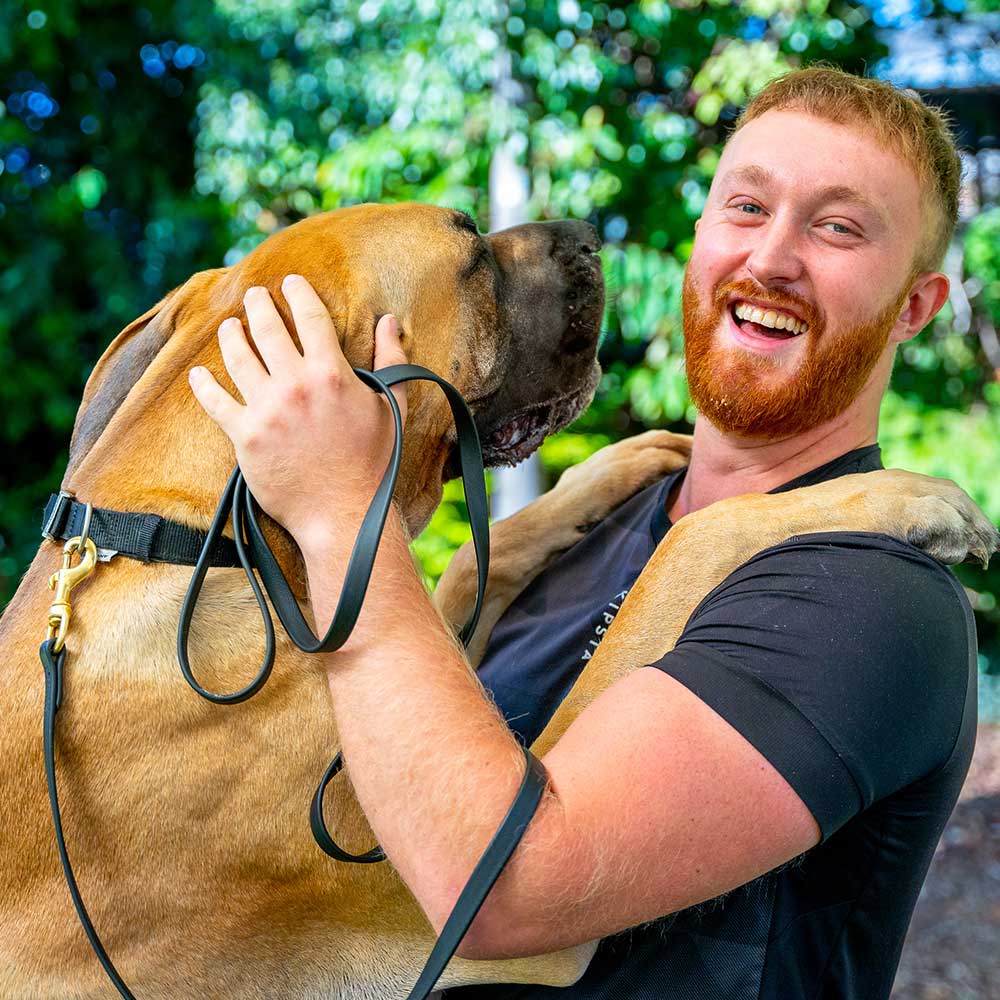Expert Dog Training Advice to Strengthen Your Bond
Expert Dog Training Advice to Strengthen Your Bond
Blog Article
The Ultimate Guide to Pet Dog Training: Change Your Family pet's Habits
Effective pet training is necessary for cultivating a harmonious connection between family pets and their proprietors. The details of canine habits and the execution of organized training strategies play a critical function in this procedure. By comprehending the concepts of favorable reinforcement, uniformity, and socialization, family pet proprietors can navigate typical challenges that emerge throughout training. This guide not only intends to equip you with the required tools to transform your canine's behavior however additionally invites you to discover just how these foundational principles can lead to a much deeper connection with your family pet. What might be the very first step in this transformative trip?
Recognizing Canine Actions
Comprehending pet dog actions is necessary for efficient training and an unified relationship in between canines and their proprietors. A pet's behavior is affected by a combination of genetics, environment, and experiences. Dog training. Acknowledging these aspects allows owners to customize their training approaches to satisfy the individual needs of their pet dogs
Dogs communicate mostly through body language, vocalizations, and face expressions. A wagging tail can indicate excitement or happiness, while a put tail may signal concern or submission. Observing these signs allows proprietors to respond appropriately, strengthening positive actions and attending to negative ones successfully.
In addition, comprehending the social structure of pet dogs can give understandings into their behavior. Canines are pack animals, and they flourish in a structured environment. Establishing clear boundaries and consistent rules can prevent confusion and advertise a complacency.
In addition, recognizing the natural reactions of pets, such as the impulse to go after or dig, is essential. These reactions can be redirected through proper outlets, such as play or workout. By thoroughly recognizing these behavioral facets, owners can foster a positive training experience, inevitably causing a well-adjusted and obedient canine buddy.
Essential Training Strategies
Effective dog training relies upon a variety of necessary methods that can significantly enhance the discovering process for both the pet dog and the owner. One essential technique is positive reinforcement, which includes rewarding desirable actions with treats, praise, or playtime. This approach motivates canines to repeat the behaviors that result in positive end results, promoting a relying on partnership between the pet and proprietor.
An additional secret method is uniformity in commands and expectations. Making use of the exact same verbal cues and hand signals helps the canine recognize what is called for, minimizing complication and advertising quicker discovering. Furthermore, establishing clear boundaries and guidelines is important for reliable interaction.
Socialization is additionally an important element of training. Exposing dogs to different environments, individuals, and other pets aids them create proper social skills and lowers anxiousness in unfamiliar situations.
Last but not least, persistence and timing are vital. Educating sessions should be regular but quick, ensuring that the dog remains involved and receptive. By utilizing these necessary techniques, owners can develop a positive and structured training experience that promotes etiquette and reinforces the bond with their canine buddies.
Creating a Training Schedule
How can a well-structured training routine boost a pet dog's learning experience? A training timetable provides uniformity, guaranteeing that dogs obtain normal, concentrated guideline. This predictability assists canines recognize what is expected of my site them, strengthening their knowing and allowing for far better retention of commands and behaviors.
When developing a training routine, it is necessary to take into consideration the dog's age, type, and specific temperament. Young young puppies may gain from shorter, more regular sessions, while adult pet dogs may grow with longer, much less regular training periods. Incorporating a range of activities can additionally keep the sessions involving, avoiding monotony and advertising interest for learning.
Furthermore, organizing training sessions at certain times of the day can aid strengthen a regimen. For example, matching training with daily strolls or playtime can create a favorable organization with learning. It is additionally essential to consist of time for reinforcement, such as treats or appreciation, to compensate preferred actions promptly.
Finally, flexibility is essential. While consistency is crucial, being versatile to the pet dog's mood or energy degree can enhance their learning experience. A well-crafted training timetable eventually lays the structure for effective interaction and a stronger bond in between the dog and owner.
Typical Educating Obstacles
Regardless of having a well-structured training timetable, pet proprietors often experience different difficulties during the training process. One usual concern is disparity in commands and cues. When numerous relative utilize various terms or tones, a canine may end up being baffled, preventing its ability to learn properly.
An additional constant obstacle is disturbance. Dog training. Dogs are naturally curious animals, and exterior stimulations such as various other animals, sounds, or individuals can divert their attention throughout training sessions. This requires proprietors to produce a regulated environment or slowly present interruptions to strengthen emphasis
In addition, differing power levels can influence training end results. High-energy canines may struggle to clear up down and concentrate, while extra laid-back types may need additional inspiration to engage. Tailoring the training method to fit the individual canine's personality is vital for success.

Building a Strong Bond
A strong bond between a pet dog this and its proprietor is necessary for effective training and general wellness. Dog training. This partnership fosters trust fund, which is critical for efficient communication throughout the training procedure. When a pet dog really feels safe and secure and linked to its owner, it is more probable to react favorably to commands and cues
To build this bond, uniformity is essential. Establishing a regimen that includes normal feeding, workout, and training sessions helps create a sense of stability. In addition, positive reinforcement techniques, such as treats, praise, and play, strengthen preferred behaviors while strengthening the emotional connection.
Socialization is an additional vital aspect of bond-building. Exposing your canine to various atmospheres, people, and other pets assists them feel much more comfy and certain, boosting the bond with their proprietor. Participating in tasks together, such as walking, playing fetch, or joining obedience training, promotes team effort and shared enjoyment.
Verdict

Understanding dog actions is vital for effective training and a harmonious partnership between pets and their owners.Efficient dog training relies on a variety of vital methods that can substantially improve the learning process for both the dog and the owner.In spite of having a well-structured training timetable, pet dog proprietors frequently come across various difficulties throughout the training process.In conclusion, reliable pet dog training counts on a comprehensive understanding of canine behavior, the application of essential methods, and the facility of a structured training routine. By emphasizing positive reinforcement and consistency, dog proprietors can considerably enhance their pet dogs' habits, inevitably making certain an unified relationship and advertising the wellness of both the pet and its atmosphere.
Report this page